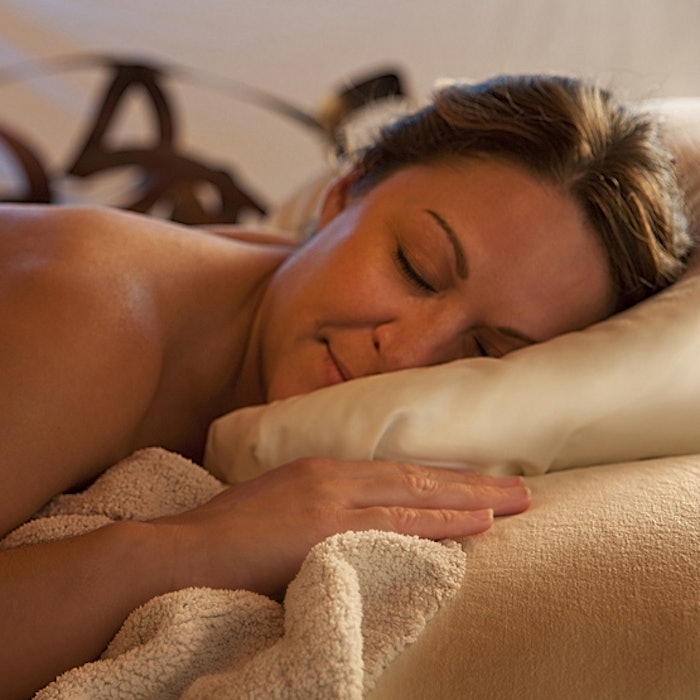
 Enjoying the Sundara Sleep Experience. [Image: Sundara Inn & Spa]
Enjoying the Sundara Sleep Experience. [Image: Sundara Inn & Spa]Sleep is integral to our lives, and affects everything from our weight to our skin to our mental health. However, society as a whole is getting less and less sleep, and the little we do get doesn’t always cut it. The Centers for Disease Control and Prevention (CDC) report that one-third of Americans admit to sleeping less than the suggested seven hours a night, while 50 to 70 million adults have been diagnosed with a sleep disorder like insomnia. The effects sleep deprivation can have on the body can be linked to a range of negatives, from dull reflexes and irritability to chronic illnesses like heart disease and depression.
A study published online in The Journal of Neuroscience (May 24, 2017) found that chronic sleep deprivation can actually cause healthy neurons and synaptic connections to be destroyed. Neuroscientist Michele Bellesi of Marche Polytechnic University in Italy examined the effects of poor sleeping habits on the brain. During normal sleep, the brain goes through a process called phagocytosis, in which microglial cells (part of the body’s immune system) refresh or destroy older neurons. Bellesi discovered that during times of chronic sleep deprivation, the brain becomes overactive and phagocytosis accelerates, cleaning out even healthy neurons.
RELATED: Do Wellness Wearables Work? We Tried Out a Philip Stein Sleep Bracelet
Other studies offer deeper and intriguing food for thought. For example, a study recently published in Sleep, Science and Practice (July 10, 2017) indicated that people who have found their purpose in life tend to sleep better. “Helping people cultivate a purpose in life could be an effective drug-free strategy to improve sleep quality, particularly for a population that is facing more insomnia,” wrote Jason Ong, associate professor of neurology at Northwestern University Fienberg School of Medicine in Illinois and senior author of the study. “Purpose in life is something that can be cultivated and enhanced through mindfulness therapies.”
You may not be able to directly help clients find their sense of purpose, but you can guide their sleep cycles down a healthier path by incorporating treatments and products that help induce and better their circadian rhythm. Here are a few spas that are already taken note:
The Lodge at Woodloch in Hawley, Pennsylvannia
The Lodge at Woodloch’s sleep program, coined the Rest+Well Blueprint, is touted as “not a program, not a single class and not a special offering, but a way of life.” It mixes a sleepy environment (including a Pillow Menu) with classes and spa treatments. The agenda is also loaded with tips and strategies that guests can use at home when they need it most. The standout spa treatment, Lavender Garden Dream (100 min./$280), features natural—and relaxing—lavender aromatherapy. Clients receive an exfoliating mineral- and lavender-rich salt scrub, followed by an essence of lavender wrap and warm stone massage.
Canyon Ranch in Tucson, Arizona
Canyon Ranch offers various courses and treatments designed to aid the sleep process. This year from September 11-14, it’s offering the Peaceful Night’s Sleep, a comprehensive sleep medicine program free to registered resort guests. Run by Canyon Ranch director of sleep medicine Param Dedhia, MD—with the help of life management, medicine, acupuncture and mind-body balance experts—the course will include acupuncture to treat stress and exhaustion, yoga for a restful night’s sleep and a class on mindfulness. A formal Overnight Sleep Study is also available and will be performed by certified technicians in an on-site sleep lab, where they will record and assess nighttime awakenings, snoring and sleep apnea ($2,950).
RELATED: More Spas Offering Treatments for Sleep-Starved Clients
Sundara Inn & Spa in Wisconsin Dells, Wisconsin
The spa’s Marma Meditation Facial (80 min./$190) is performed on a featherbed table with clients’ feet wrapped in a warm blanket (dubbed the “Sundara Sleep Experience”). Organic products are used to cleanse, exfoliate and nourish the skin, and essential oils are applied to the Ayurvedic Marma points along the neck, jaw, face and forehead to trigger relaxation. Then, the therapist leaves the room to allow guests to meditate and fall asleep; they’re awakened with the soothing rings of tingsha bells.
The Woodhouse Day Spa in Austin, Texas
With locations across the country, The Woodhouse Day Spa has created a unique menu of sleep treatments, from mixing shirodhara scalp massage with reflexology foot massages in The Soma (50 min/$105) to utilizing the soothing sounds of rainfall in conjunction with a dry brush exfoliation in Blissful Night (50 min./$120). Perhaps the spa’s most indulgent service, the Deep Sleep Massage (80 min./$155) uses heated essential oils for a head, neck, shoulder and back massage, followed by a calming tea ritual in which a warmed herbal compress is placed on the back and clients are allowed to fall asleep. A full 20 minutes are reserved for sleep at the end of the treatment.
Below, we have compiled a selection of products that aim to induce and enhance top-quality slumber.
—Sarah Reyes



















